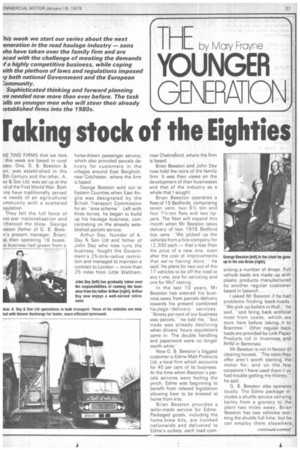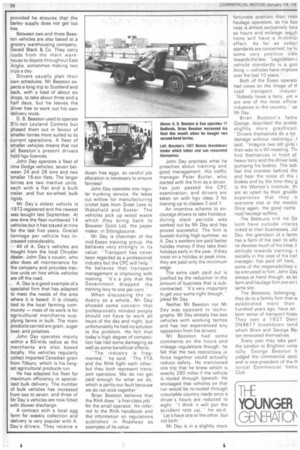Taking stock of the Eighties
Page 39

Page 40

If you've noticed an error in this article please click here to report it so we can fix it.
HE TWO FIRMS that we look : this week are based in rural ssex. One, • G. B. Beeston & on, was established in the 9th Century and the other, A. ay & Son Ltd, was set up. at the id of the First World War. Both -ms have traditionally served le needs of an agricultural 3mmunity with a scattered opulation.
They felt the full force of ost-war nationalisation and 'ithstood the blow. George ?eston (father of G. B. Beesn's present manager, Brian) as then operating 16 buses. le business had grown from a
horse-drawn passenger service, which also provided parcels delivery for customers in the villages around East Bergholt, near Colchester, where the firm is based.
George Beeston sold out to Eastern Counties when East Anglia was designated by the British Transport Commission for an "area scheme". Left with three lorries, he began to build up his haulage business, concentrating on the already established parcels service.
Arthur Day, founder of A. Day Ri Son Ltd and father of John Day who now runs the business, fought the Government's 25-mile-radius restriction and managed to maintain a contract to London — more than 25 miles from Little Waltham, near CheIrr4ford, where the firm is based.
Brian Beeston and John Day now hold the reins of the family firm. It was their views on the development of their businesses and that of the industry as a whole that I sought.
Brian Beeston operates a fleet of 15 Bedfords, comprising seven vans, two 81/2 ton and four 71/2-ton flats and two tippers. The fleet will expand this month when Mr Beeston takes delivery of two 1976 Bedford box vans. "We picked up the vehicles from a hire company for
2,300 each — that's less than the price of a new one, even after the cost of improvements that we're having done," he said. He plans for two out of the 17 vehicles to be off the road at any time, one for servicing and one for MoT testing.
In the last 10 years, Mr Beeston has steered his business away from parcels delivery towards his present combined haulage/delivery services. "Ninety per cent of our business was parcels," he told me, "but trade was already declining when drivers' hours regulations came in. The double handling and paperwork were no longer worth while".
Now G. B. Beeston's biggest customer is Edme Malt Products Ltd, a local firm which accounts for 40 per cent of its business. At the time when Beeston's parcels services were feeling the pinch, Edme was beginning to benefit from relaxed legislation allowing beer to be brewed at home from kits.
Brian Beeston provides a tailor-made service for Edme. Packaged goods, including the home-brew kits, are trunked nationwide and delivered to Edrne's outlets., each load corn prising a number of drops. Full vehicle loads are made up with plastic products manufactured by another regular customer based in Ipswich..
I asked Mr Beeston if he had problems finding back-loads.
We pick up boilers in Hull'," he said, "and bring back artificial meat from Leeds, which we store here before taking it to Braintree." Other regular back loads are provided by Link Paper Products Ltd in Inverness and RHM in Battersea.
Mr Beeston is not in favour of clearing houses. "The rates they offer aren't worth starting the motor for, and on the few occasions I have used them I've had trouble getting my money,' ' he said.
G. B. Beeston also operates locally. The Edme package includes a shuttle service carrying barley from a granary to the plant two miles away. Brian Beeston has two vehicles working the shuttle full time, but he can employ them elsewhere provided he ensures that the barley supply does not get too low.
Between two and three Beeston vehicles are also based at a grocery warehousing company, Gerald Black & Co. They carry loads from the main warehouse to depots throughout East Anglia, sometimes making two trips a day.
Drivers usually plan their own schedules. Mr Beeston expects a long trip to Scotland and back, with a load of about six drops, to take about three and a half days, but he leaves the driver free to work out his own delivery route.
G. B. Beeston used to operate 81/2-ton Leyland Comets but phased them out in favour of smaller lorries more suited to its current operations. A fleet of smaller vehicles means that not all Beeston's present drivers hold hgv licences.
John Day operates a fleet of nine Dodge vehicles; seven between 24 and 28 tons and two smaller 16-ton flats, The larger lorries are two tractive units, each with a flat and a bulk trailer, and five six-wheel bulk rigids.
Mr Day's oldest vehicle is 1972-registered and the newest , was bought last September. At one time the fleet numbered 14 vehicles but it has stayed at nine for the last five years. Overall tonnage per vehicle has increased considerably.
All of A. Day's vehicles are bought from the local Chrysler dealer, John Day's cousin, who also does all maintenance for the company and provides tractive units on hire while vehicles are off the road.
A. Day is a good example of a specialist firm that has adapted to meet the needs of the area where it is based. It is closely tied to the local farming community — most of its work is for agricultural merchants supplying farms in bulk. The main products carried are grain, sugar beet, and potatoes.
John Day operates mainly within a 60-mile radius as the merchants are also based locally. His vehicles regularly collect imported Canadian grain from Tilbury, which is his longest agricultural products run.
He has adapted his fleet for maximum efficiency in specialised bulk delivery. The number of bulk vehicles has increased from two to seven, and three of Mr Day's vehicles are now fitted with blower discharge.
A contract with a local egg farm for weekly collection and delivery is very popular with A. Day's drivers. they receive a dozen free eggs, so careful job allocation is necessary to ensure fairness!
John Day operates one regular trunking service. He takes cut willow for manufacturing cricket bats from Great Lees to Wakefield and Exeter. The vehicles pick up wood waste which they bring back to Bowater Scott Ltd, the paper maker, in Sittingbourne.
. Mr Day is chairman of the mid-Essex training group. He believes very strongly in its value: "Transport has never been regarded as a professional industry but the CPC will help." He believes that transport management is improving with training. "It's a pity that the Government dropped the training levy to one per cent.
When discussing the industry as a whole, Mr Day showed some concern that professionally minded people should not have to work all hours of the day and night, but unfortunately he had no solution to the problem. He felt that today's high degree of cornpetition has had some damaging as well as some beneficial effects.
''The industry is fragmented," he said. "The FTA and the RHA fight each other, but they both represent transport operators. We do not get paid enough for what we do, which is partly our fault because we do not stick together"
Brian Beeston believes that the RHA does ''a first-class job'' for the small operator. He referred to the RHA handbook and the' information on regulations published in Roadway as examples of its value.
John Day practises what he preaches about training and good management. His traffic manager Peter Butler, who started with the firm as a driver, has just passed the CPC examination, and drivers are taken on with hgv class 3 for training up to classes 2 and 1.
An incentive scheme to encourage drivers to take holidays during slack periods was worked out by Mr Day and has proved successful. The firm is busiest during high summer, so A. Day's workers are paid better holiday money if they take their holidays early in the year. If they insist on a holiday at peak time, they are paid only the minimum wage.
The extra cash paid out is justified by the reduction in the amount of business that is subcontracted. "It's very important to get your sums right though," joked Mr Day: Neither Mr Beeston nor Mr Day was opposed to tachographs. Mr Day already has two vehicles with working tachos and has not experienced any opposition from his drivers.
Mr Beeston had some comments on the hours and mileage regulations though; he felt that the two restrictions in force together could actually reduce safety. He mentioned one trip that he knew which is exactly 280 miles if the vehicle is routed through Ipswich. He envisaged that vehicles on that run would be re-routed through unsuitable country roads once a driver's hours are reduced to eight. "I think it will put the accident rate up,he said. "Let's have one or the other, but not both."
Mr Day is in a slightly more
fortunate position than man haulage operators, as his bus ness is almost exclusively loca so hours and mileage regul; tions will have a minimut effect. As far as vehicl standards are concerned, he hE. some very positive vieln towards the law. "Legislation c vehicle standards is a goo thing —.vehicles have improve over the last 10 years.'' Both of the Essex operato had views on the image of road transport induste "Nobody loves a.lorry, yet vs are one of the most efficiel industries in the country," sa Mr Day.
Brian Beeston's fathe George, described the proble slightly more graphicall. -Drivers themselves do a lot damage without realising,,;' said. -Imagine two old girls their way to a WI meeting, Th( find themselves in front of heavy lorry and the driver keel .pumping his brakes. The ladi, feel this monster behind the and hear the noise of the E brakes and by the time they g to the Women's Institute, thi are so upset by their gruellit experience that they tE everyone else at the meetin Once again, the good name road haulage suffers."
The Beestons and :he Da both have outside interes linked to their businesses. Jol Day, the grandson of a farmt has a farm of his own to whi, he devotes much of his time. lattitude towards training, E pecially in the case of his traf manager, has paid off here, some of the responsibilities c; be entrusted to him. John Day always at hand though, as bc farm and haulage firm are on t same site.
The Beestons, belonging they do to a family firm that w established more than hundred years ago, have an born sense of transport histoi They own a 1927 Denr DN9617 breakdown tend which Brian and George Be( ton renovated themselves.
Every year they take part the London to Brighton vinta rally. George Beeston h judged the commercial secti and is vice-president of the H torical Commercial VehiE Club.




































































































